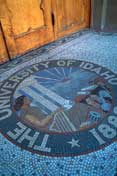Natural Resources & Environmental Law
The history and economic viability of Idaho and the Pacific and Inland Northwest is inextricably tied to its natural resources. Beginning with its Native American inhabitants, the people of the region have deep ties to its natural beauty as well as the opportunity for livelihoods provided by its abundant resources. Legal and political issues involving natural resources have figured prominently in the region’s history. The Natural Resources and Environmental Law program takes a transformative approach to legal education by focusing its curriculum and its interdisciplinary offerings at the intersection of law, science, and society. Our philosophy is that students should follow the leadership and counselor model of the legal profession by obtaining the breadth in education to guide clients to lasting solutions of the problems underlying resource conflict. The University of Idaho’s Moscow location allows collaboration with its nationally recognized natural resource, environmental and agriculture academic and research programs at Idaho’s Land Grant University with – making this an ideal place to study natural resource and environmental law (NREL).
In 2008 Idaho Law introduced an emphasis in Natural Resources and Environmental Law (NREL), allowing you to earn a designation on your diploma upon completion of at least 16 hours of designated course work in the area and satisfaction of the Upper Division Writing Requirement under the advising of one of the NREL faculty. The program was developed in response to the general fact that the practice of law is becoming more specialized and specifically that the practice of natural resources and environmental law has become highly technical and complex. The course of study is designed to give you broad expertise in Natural Resources and Environmental Law and an understanding of how to develop in-depth expertise in a specific topic while not sacrificing your broader legal education. In addition, due to the strong collaboration between the College of Law and other Colleges at the University of Idaho through the development of concurrent degrees in Water Resources and Environmental Science, you will have the opportunity to enrich your experience by taking courses outside the law school and learning to integrate science and social science with law.
- NREL Requirements and Study Plan (PDF) (Updated: Nov. 2, 2015)
Launched in 2006, the University of Idaho Waters of the West (WoW) – the only interdisciplinary program of its kind in the Pacific Northwest and one of few such programs in the nation – draws on expertise of 56 faculty members in seven colleges to integrate aspects of law, natural resources, engineering, political science and more. The unique program focuses on developing sophisticated strategies and solutions to the world's critical water shortage. Students may obtain either an MS or a PhD in any of three tracks within the Water Resources Program concurrently with their JD. Double counting of 18 credits for the JD/MS and 21 credits for the JD/PhD allows completion of the JD/MS in four years and the JD/PhD in 6 years.
Admission
Students are required to apply separately to the College of Law and the College of Graduate Studies, Water Resources Program, and on acceptance to each college, must apply to the concurrent degree program. The LSAT may be substituted for the GRE on application to the College of Graduate Studies. Acceptance to both colleges does not have to occur simultaneously.
More:
- Water Resources Web Site
- Water Resources Handbook (PDF)
Course of Study
The first year will be completed entirely in the law curriculum. Students may begin taking graduate courses in their second year and should finalize selection of a graduate committee and filing of a study plan with the College of Graduate Studies by the end of their 2nd year. Law fees will be charged for the first 3 years of study and graduate fees will be charged for each subsequent year.
Rising interest in the connection between sustainable economic development and environmental protection has increased the demand for professionals with both legal and technical training. To meet this demand, the University of Idaho College of Law and the University of Idaho College of Graduate Studies Environmental Science Program offer a concurrent degree program.
The concurrent program combines the study of scientific, social, philosophical and legal aspects of environmental issues.
The program is designed to allow students to obtain both a J.D. from the College of Law as well as a M.S. Environmental Science from the College of Graduate Studies in as few as eight semesters through double counting of 18 credits.
Admission
To be eligible for the concurrent Juris Doctor (J.D.)/Master of Science (M.S.) in Environmental Science program, you must apply separately and be admitted into each program and then be admitted into the concurrent degree program. The LSAT may be substituted for the GRE on application to the College of Graduate Studies. Admission into the concurrent degree program is dependent on a demonstrated ability to excel in an intense, interdisciplinary educational environment.
More:
Course of Study
The first year will be completed entirely in the law curriculum. Students may begin taking graduate courses in their second year and should finalize selection of a graduate committee and filing of a study plan with the College of Graduate Studies by the end of their 2nd year. Law fees will be charged for the first 3 years of study and graduate fees will be charged for each subsequent year.
Faculty Research Interests
You will select a faculty advisor in your first year of law school for the purposes of developing your course of study and your writing topic. You should select an advisor with research interests in an area you are interested in.
Jerrold Long
Dr. Long’s research is in land use law and subjects relating to the interdisciplinary “Water of the West” program at the University of Idaho. Professor Long is also an Affiliate Professor in the University’s Water Resources. His dissertation – New West or Same West?: Evolving land-use institutions in the American West – explored how local land-use regimes respond to social and cultural change.
Stephen R. Miller
Professor Miller’s research interests include land use, climate change, real estate development, and the ways in which administrative law at the federal, state, and local levels structure our relationship with the environment. His research currently focuses on rapidly growing urban places, including many cities of the Mountain West, and how they relate to the environment.
Dylan Hedden - Nicely
Professor Hedden-Nicely interests include Native American natural resources law, water law, tribal treaty rights, tribal civil and regulatory jurisdiction, law and science, tribal economic development, tribal governance, Native people in the legal profession.
Richard Seamon
Professor Seamon has written two books on administrative law and many law review articles on issues of constitutional law and other public law subjects. He also served in the U.S. Department of Justice as an assistant to the Solicitor General of the United States.




